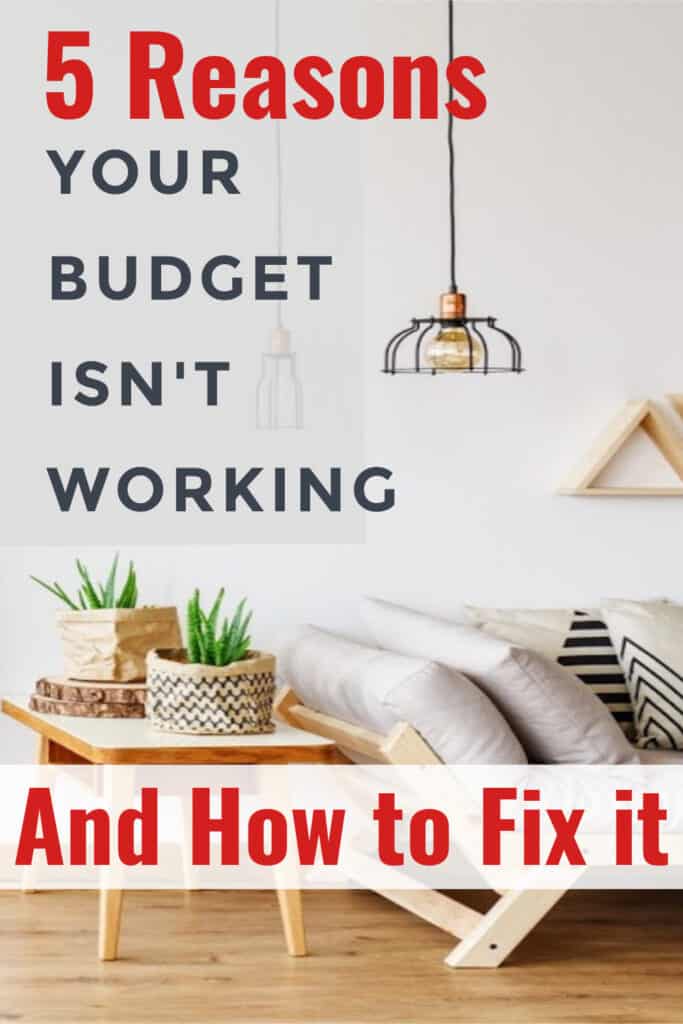“This post may contain affiliate links. Please read my disclosure for more info.
5 Reasons Why Your Budget Isn’t Working – And How to Fix It
previous post
“This post may contain affiliate links. Please read my disclosure for more info.
If you’ve ever given up in frustration, concluding that your budget doesn’t work, you’re not alone. A recent survey found that 65% of Americans have no idea how much money they spent last month. But the reason why your budget isn’t working could be easier to fix than you might think.
Tracking down and documenting each expense is the easy part. But over the next few months, when expenses never seem to follow a pattern, it’s tempting to give up.
The five most common reasons why your budget isn’t working are not hard to fix. And once you do, your budget can go from an exercise in frustration, to your bridge out of paycheck to paycheck life.

Table of Contents
Beginning your own budget is like getting a plane off the ground for the first time. You’ll sputter and stall – probably for several months, as you try to get every expense accounted for.
There’s no cookie cutter budget that fits everyone, because it needs to reflect your life. The process of documenting your expenses, then recognizing where your money leaks are, and beginning to make adjustments will easily take several months.
But the longer you stick with it, the more empowering it can be. Good or bad, money is the common denominator in almost anything we get to do in life, so controlling it means you have more control over your life.
Related: 10 Free Budget Templates That’ll Make Budgeting Easy

The first time we started a budget, I counted almost $1000 a month on food for three people. And that’s in addition to take-out orders, and food on the road. We spent over $200 a month on cable, and $100 every weekend with nothing to show for it. And I wondered why we “couldn’t afford” an emergency fund.
Documenting expenses is a great start, but like Dave Ramsey says, managing your money is really only 20% money know-how, and 80% behavior. After a few months of tracking your money, a budget should uncover where you can trim expenses, and it’ll probably mean a few lifestyle changes.
This is when it’s the most tempting to throw in the towel, because it’s uncomfortable making changes. But sticking with it means you’ll probably find yourself thinking hard about what you value the most. In the short-term, that’s uncomfortable, but longer-term, it’ll mean actually getting to do those things you value.
The one concept that took me a while to see, is that budgets work best when they include only regular, predictable expenses. What’ll sabotage all your work is the sudden $900 car repair, or those constant non-emergency, but unexpected expenses.
Your budget will become much easier if you add two simple components:
Emergencies need to be paid for in cash that’s separate from your budgeted money. Nothing makes you want to throw in the towel more, than fine-tuning your budget for months, then having your clothes washer die and having to come up with $700 somehow.
Things like this are always going to happen, and having to use budgeted money, or a credit card (which increases your budget) is why so many of us never escape paycheck to paycheck life.
It’s not as hard as it might seem to save $1000 in an emergency fund. Here’s the surprisingly simple way we started our emergency fund that was virtually painless.
A sinking fund is like an emergency fund, only in that it’s separate from your checking account.
Sinking funds are used for two reasons:
Here’s how to setup sinking funds, and the types you might want to consider.
There are so many things competing for our paycheck, that without some kind of north star, it’s common to zig-zag in multiple directions, never really working towards anything.
Whether it’s finishing school, transitioning to a different career, moving to another area, starting a business, buying a home, paying off debt… having one over-arching goal can make lots of other decisions fall into place.
A personal goal for the next year or two can also be a big motivator to do regular budget checkups to maintain your progress.

Sometimes the phrase, “it’s a work in progress” can have a negative connotation, but not with your budget. Because as they say, if there’s one constant in life, it’s change.
There’s always gonna be a new wrinkle that affects your spending:
It can take several months to nail everything down, but once you do, a quick, 20 minute budget checkup once a week will help you to stay ahead of the game. You can celebrate your progress, and strategize for anything that might be coming up. And if you’re budgeting as a couple, a weekly check-in can head off misunderstandings and help you to stay on the same page.
One thing that could make budgeting hard right from the start, is the negative connotation it has. It implies saying no to things, or giving up things you may be used to doing.
But it’s actually a tool that forces you to decide what’s at the top of your list, so you’re able to say yes to those things.
When you’re older, what would be more satisfying than to be able to say you lived your life with intention. You did what you wanted to do, saw the places you wanted to see, and lived the way you wanted.
Since money is a factor in most things we get to do, controlling it can open up a lot of doors. If your budget isn’t working now, one, or a few of these tips could be the missing piece.
